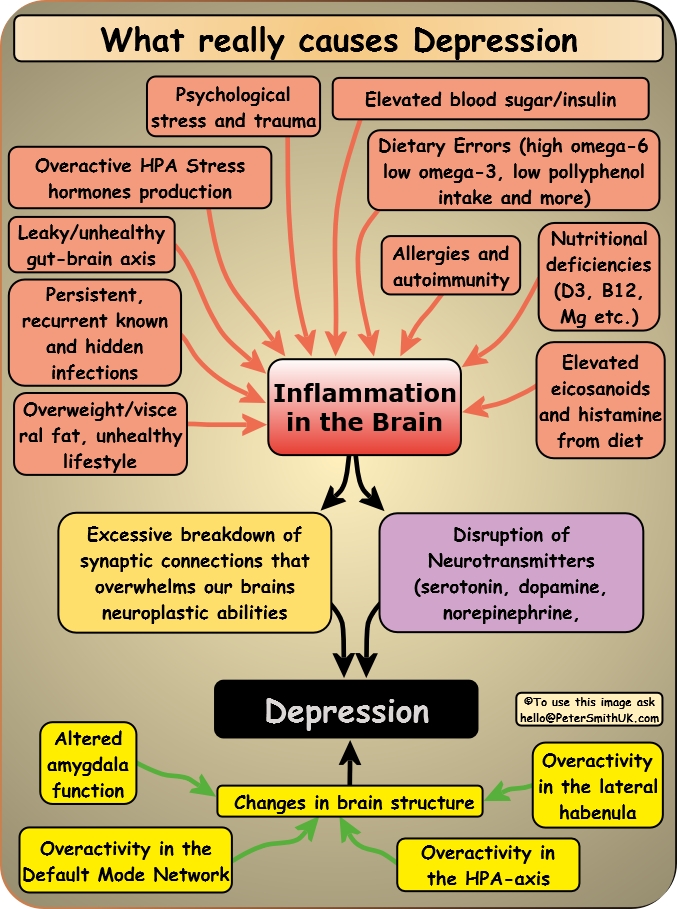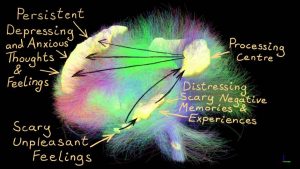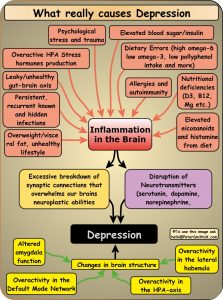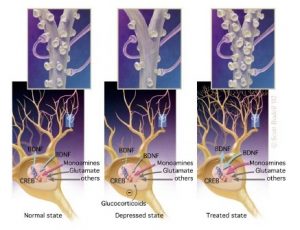
What causes depression?
If you still think depression is either:

– Low levels of serotonin or dopamine or ¶
– That it’s all in the mind due to stress and trauma,
then you need to update your understanding.
We now have a completely new understanding of what depression actually is, of what causes it, and how to treat it.
New Theories of What Really Causes Depression
The first new understanding is that what disrupts neurotransmitters in the first place is excessive levels of inflammatory chemicals called cytokines.
VIDEO coming soon.
What’s the connection between depression and psychological stress
Inflammation disrupts neurotransmitters and damages brain circuits involved in depression
VIDEO coming soon.
Harmful levels of cytokines can come from many sources, but what is interesting is it appears the most common cause is psychological stress and trauma. Stress and trauma are risk factors that can cause depression in susceptible individuals, but they are not the condition itself. Not everyone that has stress and trauma responds by becoming clinically depressed, and we now know that people can develop depression without the input of psychological stress just by having an inflamed brain. Drugs and infections that ramp up inflammation in the
brain
can trigger depression in humans and animals. Elsewhere I discuss why do some people develop depression due to stress and trauma while others don’t and what you can do to increase your resilience to stress.
This new understanding of what unites the biological neurotransmitter model and psychological model of depression.
Cytokines not only disrupt neurotransmitters but when cytokine levels are persistently elevated they can breakdown synapses more quickly than our brains (neuroplastic) ability to maintain and regenerate them. So depression is not just a lack
of neurotransmitters it’s also a lack of synapses ‘left’ to make and transmit neurotransmitters.
The solution to this problem is firstly to eliminate all source of unnecessary inflammation and boosting neuroplasticity to regrow lost synapses; growing synapses is absolutely possible.
How to treat stress-induced depression
Simply avoiding stress is not really possible, no matter what you do in life every once in awhile life will hit you with some stressful circumstances. Moreover the source of your physiological stress responses may not be particularly connected to the outside world, you may be carrying internal psychological stress from past traumatic memories and learnt stressful psychology.
The solution is to reprogram the way your brain triggers stress responses and manages stress responses. I teach a brain training programme to train your brain how to switch off overactive stress responses will quickly and efficiently, we now know from brain scans that we can change the shape and functioning of the brain with as little as 50 hours of training which takes just 3 to 6 months of work. In addition to training the way the brain manages stress responses we can revisit, disrupt and reprogram traumatic memories and stressful learnt psychology using modern psychotherapy techniques. Both are important, if you only change the stressful psychology you still have to do the brain training because prolonged periods
of stressful psychology hardwire stress inducing systems and networks into the brain and even after you may have reprogrammed the stressful psychology and traumatic memories the stress creating wiring is still left behind in the brain. In other words, you could resolve the psychology you still have to deal with the legacy in the physical brain.
Scans show enlargement and overactivity in a structured called the amygdala (a structure that warns us when something is wrong in our environment or situation), this repeatedly and excessively triggers unhappy thoughts and feelings.
 Brain scans of depressed brains also show overactivity in a network called the default mode network that feeds the conscious thinking cortex of the brain with distressing feelings and negative memories. In a healthy brain, this network enables us to have a balanced think about distressing and worrying experiences and learn from them, but in the depressed brain this system doesn’t switch off and the thinking cortex is continually bombarded by depressing information.
Brain scans of depressed brains also show overactivity in a network called the default mode network that feeds the conscious thinking cortex of the brain with distressing feelings and negative memories. In a healthy brain, this network enables us to have a balanced think about distressing and worrying experiences and learn from them, but in the depressed brain this system doesn’t switch off and the thinking cortex is continually bombarded by depressing information.
The good news is brain scans show we can make real changes in the in parts of the brain involved in depression with brain training and meditation exercises. These changes are basically
permanent, once made they will persist until something very significant undoes them.
Changing the depressed brain with meditation brain training
Scans have revealed that in the depressed brain there are changes in the amygdala for example, (a structure that warns us when something is wrong) is overactive and often enlarged in the depressed and anxious brain; an overactive amygdala will trigger unhappy and anxious feelings excessively
The default mode network (DMN) is a circuit that assembles distressing feelings and negative memories together and relays this info
rmation to the thinking cortex; the overactive DMN in the depressed brain results in our conscious thinking mind being constantly excessively bombarded with distressing and negative information.
 One of the most researched and significant differences seen in the depressed brain is overactivity in the HPA-axis. Overactivity in the HPA stress physiology is such a significant contribution to depression and other mental health problems that in my practice I developed specific techniques to directly train the brain how to switch off physical s
One of the most researched and significant differences seen in the depressed brain is overactivity in the HPA-axis. Overactivity in the HPA stress physiology is such a significant contribution to depression and other mental health problems that in my practice I developed specific techniques to directly train the brain how to switch off physical s
tress responses and change the way the brain manages stress responses. In addition to meditation type brain training exercises psychotherapy to remodel stressful ways of thinking and past traumatic memories that trigger stress responses without their being real… UNDER CONSTRUCTION MORE SOON …
…can be a help but they have less direct and slower effects on the HPA axis. I teach HPA relaxation brain training exercises and meditation exercises specifically for people with mental health problems in both by individual consultations and in regular groups. You can only techniques either as part of a regular individual consultation with me, you can also learn them by joining my Affordable Drop-In Meditation Classes Specifically for Mental Health Problems
Many things can cause the prolonged elevated cytokine levels that eventually cause depression including psychological stress, trauma past and present, an overactive HPA stress axis, common dietary mistakes especially high omega 6/3 ratio and a lack of pollyphenols, elevated blood sugar, persistent infections which can be hidden in the background, leaky-gut, SIBO, unhealthy gut-brain axis and several other things. The inflammation these thing cause add together so the best cause of treatment is to eliminate inflammation from every source; leaving just one significant source of inflammation untreated may result in a lack of effective treatment.
To read more about what really causes depression and new treatment approaches click here, or to book an appointment.

